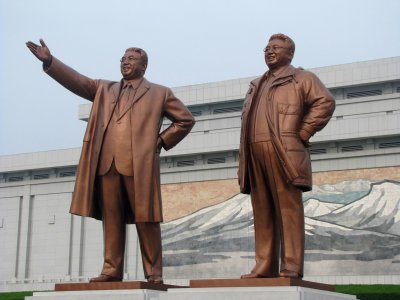
DICTATOR CHIC
Authoritarian leadership may be fashionable today, but it is usually a poor tribute act to the dictators who ruined the twentieth century for millions and extinguished the belief that life could only get better.
Hitler, Stalin, Mao, Mussolini, Franco, Hoxha, Mobutu, Bokassa, Gaddafi, Saddam, Assad, Duvalier, Mengistu, Ceausescu, Kim Il-Sung, to name only a few.
The dinner party list from hell.
How were so many thrown up at once in that benighted century?
It was a period of epic socio-economic dislocation, which combined with the crash of 1929 created fear, uncertainty and opportunity for those with a malevolent agenda. Revolutionary ideology was dominant. The dictators of the left tended to lead their people into famine, the dictators of the right, into war. Both used purges to strike terror into the heart, to divide one from another, to foster mistrust and to ensure no other power bases could be established.
To be an enemy of the people meant anyone who opposed the dictator. No-one felt free to speak their mind lest they be reported, which meant no-one really knew what anyone else truly thought about their beloved leader, thus perpetuating the problem. When dictators fell, the demise could be spectacularly quick. Ceausescu’s address to the crowds on December 21st, 1989 was met, for the first time, with boos. Four days later he was summarily executed.
One reason so many dictators were thrown up in such a short space of time owes something to the power of imitation. Mussolini copied Hitler who coped Mussolini. Mao imitated Stalin, as did Saddam. Each carefully studied the architecture of malevolent power, learning from the successes and mistakes of the others. Yet despite the similarities, there were curious differences. North Korea’s Kim Il-Sung, displaying the irony-free space that only a dictator can truly occupy, built hideously big statues of himself. By contrast, Hitler would not permit the erection of statues, believing they should be reserved for great historical figures. Stalin named streets and cities after himself, while Mao would not.
All these details, and more, are found in Frank Dikotter’s book How to be a Dictator (Bloomsbury, 2019). In his view, the cult of personality is not an ancillary feature of dictatorship, but fundamental to its exercise. Each of these men went to the toilet, got ill and threw up like the rest of us, but were never viewed this way, thanks to relentless state propaganda. And each dictator believed their own lies. The emperor may not have had any clothes, but no-one was likely to point this out while informers and secret police could be found on every street corner and in every bar.
Their stories shed light on the temptations of Jesus in the wilderness. Having deprived himself of food and shelter for so long, Jesus could have felt humiliated and resentful of others. The devil clearly thought this point of acute vulnerability was the moment to work him over, like a regime’s interrogator in the middle of the night. This was the fork in the road for Jesus. One path led to, and through, the cross. A journey of pain and isolation. The other led to glamour, riches and domination, secured by selling his soul to the devil. Had Jesus chosen the latter, he could have exercised the power given to him to create a cult of personality based on limitless power. You start by turning the stones into bread, and you end with sumptuous feasts in a palace while people starve in the fields. You begin by throwing yourself off the temple, only to be caught by the angels, and you end with a secret police state, where no-one gets near you and the unenthusiastic are tortured in basements.
The leadership Jesus offered was one of service and sacrifice. He had no interest in saving his own skin, only ours. The closer society comes to having leaders who embody this ethic, the better life is for everyone. Few people have the lust or the opportunity to become a national dictator, but each of us is faced with innumerable small decisions that place us on a continuum that starts with Jesus and ends with a monster.
And it’s a scale that can slide.
POPULAR ARTICLES

Obama's Covert Wars
The use of drones is going to change warfare out of all recognition in the next decades.

Through A Glass Starkly
Images of traumatic incidents caught on mobile phone can be put to remarkable effect.

What Are British Values?
Is there a British identity and if so, what has shaped the values and institutions that form it?


